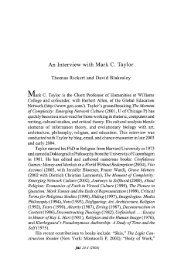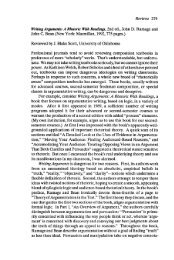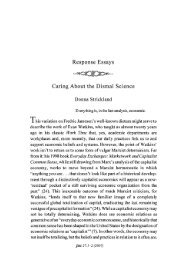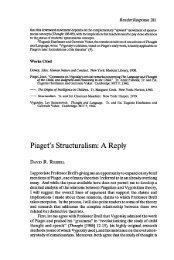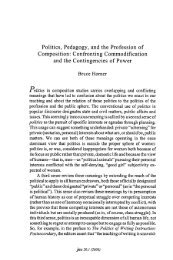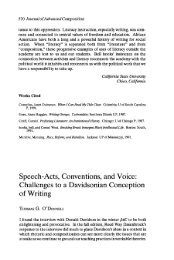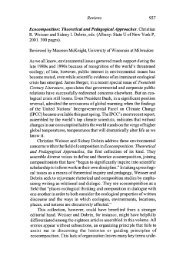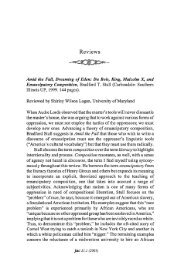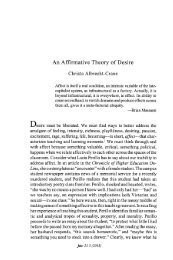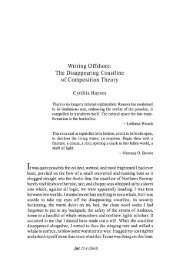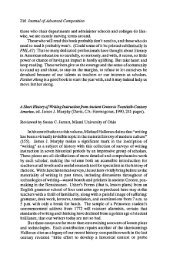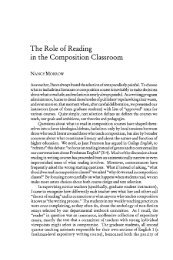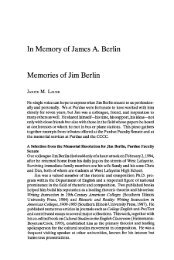It's aQuestion ofFaith: Discourses of Fundamentalism ... - JAC Online
It's aQuestion ofFaith: Discourses of Fundamentalism ... - JAC Online
It's aQuestion ofFaith: Discourses of Fundamentalism ... - JAC Online
You also want an ePaper? Increase the reach of your titles
YUMPU automatically turns print PDFs into web optimized ePapers that Google loves.
<strong>Discourses</strong><strong>of</strong> Fundementalism 339<br />
woman not a woman who lived thousands <strong>of</strong> years ago." This emphasis on<br />
distinguishing between past/present isalsoreflected in the phrases "Old Testament<br />
stand point, ""twentieth century logicand understanding," and "Back in this time."<br />
Arguing that the tale can only be understood within the context it waswritten, Luke<br />
callsany other reading naive.<br />
Luke's resistance to arevisionist reading <strong>of</strong> this biblical story isunderstandable<br />
given how he views the authority <strong>of</strong> biblical text asthe literal and unmediated word<br />
<strong>of</strong> God, an authority <strong>of</strong> meaning that must remain stable and unified across time to<br />
ensure that all readers can accessthe same moral creeds. Rather than retrieving this<br />
moral from the story <strong>of</strong>Lot, Luke argues,the poem (and,by implication, the narrator)<br />
"takes a standpoint that isvery sympathetic to Lot's wife." It isthis standpoint-a<br />
situated reading from a "modern" perspective-that Luke cannot accept. Using<br />
phrases that reflectLuke's attempt to convey an "objective" perspective-"the fact still<br />
remains" and "Obviously"-Luke suggests that those who "impose" twentieth<br />
century logicarenaive. His statement "You cannot justify looking back and therefore<br />
breaking God's command by nostalgia" refersnot only to this specificpoem but also<br />
to Luke's overall philosophy <strong>of</strong>how biblicaltexts canbe read. Readingtextsthrough<br />
a revisionist lens is dangerous, Luke suggests, becausesuch readings are used to<br />
"justify" actions that conflict with God's will. If the Bible's textual authority is<br />
destabilized, God's authority isequally open to interpretation-and revision.<br />
Given Luke's perspectiveon the authority <strong>of</strong>meaning within biblicaltext, it's not<br />
surprising that he does not mention the other two articles that were assignedon this<br />
day. What I first attributed to possible laziness on his part (perhaps he hadn't read<br />
them or just didn't feel like taking the time to write about them) could also be<br />
attributed to the fact that, for him, the Bible is the sole source <strong>of</strong> authority for<br />
interpreting allother texts. Incorporating ideasfrom the articlesto interpret the poem<br />
would have led him to the same downfall asthe narrator <strong>of</strong> the poem, atwentieth<br />
century "stand point" that might have justified readings contradictory to God's<br />
intentions. Luke might have used biblical authority to critique the "secular" essays,<br />
but he chose instead to focus on the objectionable reading that the narrator <strong>of</strong>fers.<br />
Although Luke 0 bviously does take an interpretive stance to the poem, he views<br />
himself ascorrecting and informing the narrator's naive and nostalgic perspective<br />
rather than adopting an interpretive position himself As Boone suggests,fundamentalists<br />
do not view texts as<strong>of</strong>fering multiple readings-there are correct or incorrect<br />
readings <strong>of</strong> atext and those with moral authority have the ability to discern which<br />
reading istrue (20).<br />
Luke's resistance to the author's revisionist reading might be subtly directed to<br />
me aswell. AsKincheloe notes, students with fundamentalist assumptions <strong>of</strong>ten view<br />
teachers asthe enemy, secularhumanists who attempt to destroy faith by undermining<br />
religious authority. Kincheloe saysthat ministers and parents <strong>of</strong>ten warn students to<br />
remain ever vigilant in fending <strong>of</strong>f such attacks to their religious values (50).Luke's<br />
concluding statement, "You can not justify looking back," could be interpreted asa<br />
reminder to himself or asawarning to me-the one who has selected the poem to<br />
begin with-that he will not succumb to what he views asthe heretical reading <strong>of</strong> a



